

4 October, 2021
22 Hours Online + 30 Hours Homework
€ 2450
So much is clear: there will always be new digital technologies. So – as a medium-sized or big public or commercial organisation, how do you organise for that? How do you define a technology operating model that reaps the benefits of these new technological innovations repetitively? What model will allow you to actually deliver these digital innovations rapidly, successively and at scale? And how does all of that relate to the configuration of your Tech-Team, your budgeting process and governance, your risk appetite and your Digital DNA & Leadership?
The recent pandemic has illustrated the importance of leveraging technology to help businesses respond and keep operations afloat. Organisations that have identified the technology shifts that fundamentally matter most to them and that have adjusted their technology operating model accordingly have prevailed. By design, they are better equipped weather the storm. They have positioned themselves to scale and thrive due to their ability to identify, trial, scale and fail new digital technologies.
The foundation for this WBAF course lies in a Deloitte Insights research article, written by Dr. Andries van Dijk and Hans van Grieken, your WBAF Faculty Member in this course. Deloitte has graciously permitted the re-use of these insights in support of WBAF’s Business Transformation Courses. This WBAF course focusses on 9 significant shifts that are taking place at the same time, and that will determine the characteristics of your future Technology Operating Model, irrespectively of the individual technologies involved. This course will help you understand on a deeper level the meaning and implications of the shift towards Scaled Agile and DevOps, its relation to relation to the move to cloud and platforms, the growing importance of data and cognitive, the configuration of your tech workforce and five other shifts that are highly interlinked. During this course, it will become evident that these shifts are complex phenomena by themselves. But moreover, that they are all relevant and highly interconnected (1), that they need synchronisation (2), that they will always involve organisational «pain» (3) and therefore need the buy-in of the executive team collectively (4).
The Target audience of this course is joint executive business and technology teams of medium-sized and big companies, in both the public and the private sector (500+ employees).
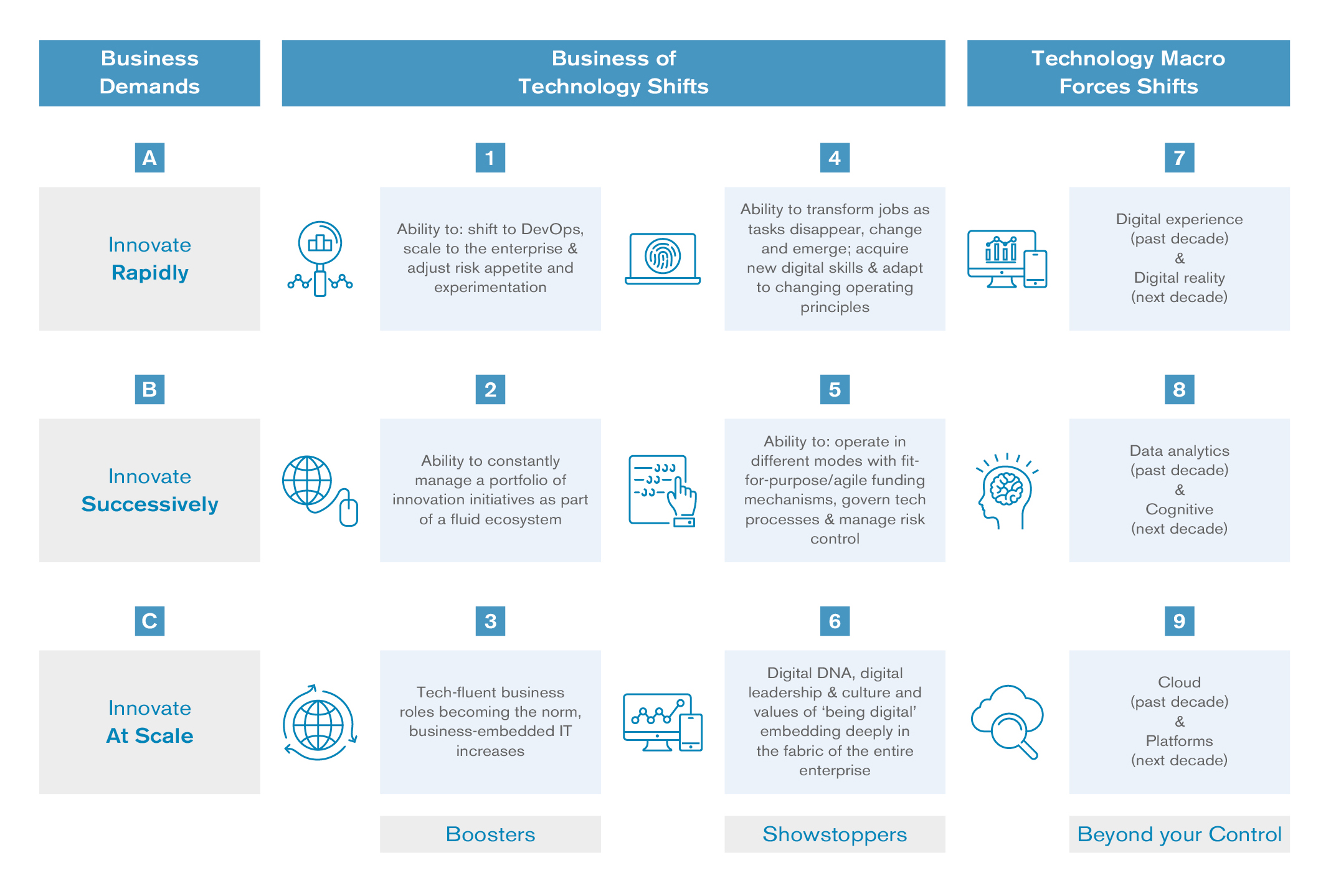
As new technologies such as the Internet of Things, Artificial Intelligence, Robotics, and Virtual Reality proliferate, endless new combinations of innovations emerge as well. As a result, organisations are coming under mounting pressure to rethink not just their technology strategy but their entire business strategy. Moreover, the nature of these new technologies opens up exciting possibilities to create or new digital products or services or engage in new platforms and ecosystems to unlock business value. Hence, these new digital technologies have the potential to disrupt entire markets, value chains and business models. Most traditional businesses or public sector organisations realise they cannot «get away» with just implementing digital technology to improve operations. They realise they need to drive new customer/citizen’s value. Therefore, the ongoing digital technology push will force enterprises to better organise how they identify, trial, evaluate, risk assess and scale or fail new digital technologies to make them business relevant.
Presentation by the lecturer: 60 min
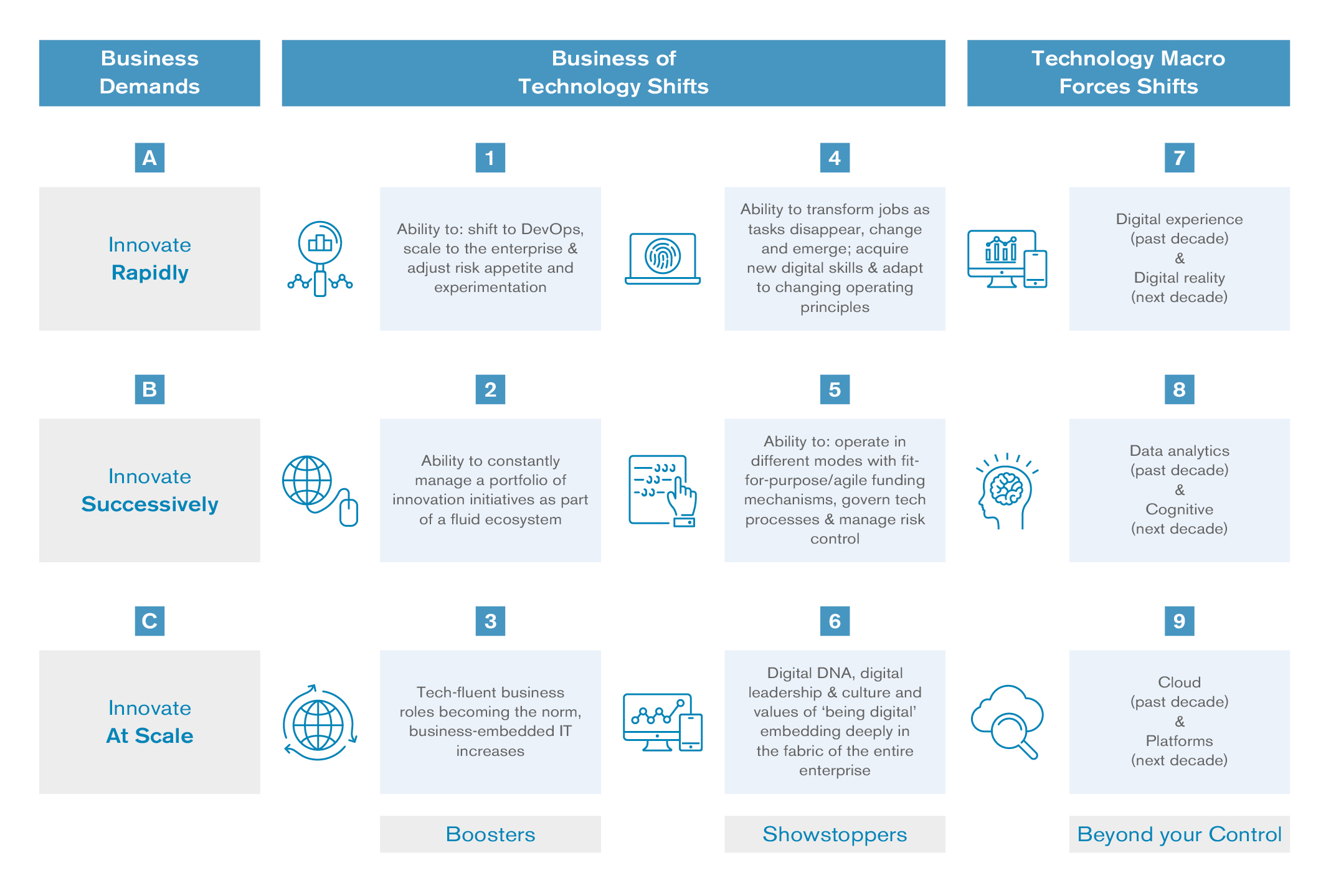
Zoom breakout session — Getting to know each other and sharing experiences: 30 min
Q&A: 20 min
Progress check: 10 min
As (digital) disruption becomes more pervasive, organisations need to change course in real time based on current market realities. Most companies have already started with Agile Initiatives on a small scale. This Module is about the ability to scale to enterprise organisation wide agility, extending to DevOps and DevSecOps, whilst adjusting the corporate risk appetite and experimentation capabilities.
Presentation by the lecturer: 60 min
While establishing a handful of successful Scrum teams is a good start with Agile, taking it to the program or enterprise level is much more complex. This Module will explain how enterprises deploy new mechanisms to manage dependencies (for which frameworks like SAFe or LeSS can be used). How organisational design principles should be adapted to the Agile way of working as well, impacting the core of the organisation’s culture and work style. How funding, governance and sourcing need to be aligned. Scaling Agile to the enterprise level also requires capabilities like Enterprise Architecture (EA) to be redefined to an incremental and just-in-time iterative approach. Architectural artefacts need to be delivered ‘just in time’ to the heartbeat of the Agile process, ‘just enough for the sprint at hand.
While Agile sometimes focuses only on development, DevOps covers the whole life cycle of the application. This model will explain the basics of how DevOps practises combine software development (Dev) with IT Operating (Ops) with the intent to shorten system development life cycles by process of continuous delivery that secures high-quality software. The Module will also touch upon the importance of integrating security operations into DevOps practises. This so-called DevSecOps approach concerns the creation of a culture and environment that foster close collaboration between development and operations, making security part of the entire product journey. The objective of DevOps and DevSecOps is to move away from big bang software releases and deploy software more rapidly, more frequently, and more reliably.
The Module will end with a broad discussion around the topic of risk appetite and degrees of freedom for experimentation. Agile ways of working and – over time – DevOps allow for rapid experimentation. In a lot of worlds that are being disrupted – both within the private as well as the public sector – time to market has become of crucial importance: getting it 100% right the first time versus getting there in time are sometimes tricky trade- offs. In many cases, this means that Enterprises need to make fundamental choices about their risk appetite while understanding that ‘doing nothing’ constitutes a risk as well. Enterprises and public sector organisations that learn by experimenting need mature Agile capabilities, combined with concepts like Lean Startup and Design Thinking.
Zoom breakout session — interview your fellow students on their company/organisation’s status quo regarding agile ways of working/DevOps, DevSecOps and Risk Appetite/experimentation: 30 min
Presentation of findings + discussion: 30 min
To innovate successively, companies need to organise themselves to do so. A one-off innovation success may occur accidentally; successive achievements however can only be established intentionally.
Presentation by the lecturer: 60 min
How do enterprises build capabilities to anticipate new technology trends better and spot early-stage opportunities to spur idea generation and drive investment decisions? This Module will portray companies that are rather good at this and how they organised their digital disruption radar screen accordingly. They well prepared joint business and IT meetings in which they identify potential digital disruptive technologies, both as a potential threat as well as a possible opportunities. How to disrupt others in their market or allow them to enter a new markets?
To succesively innovate, companies need to have a pipeline of innovative ideas and related initiatives and manage these as a portfolio. This Module portrays some of the new engagement models that foster creativity and ideation within ecosystems of technology vendors, academia and other sources of innovation.
The Module will portray how new business ecosystems are based on open innovation and collaborative problem solving. Ecosystems that allow organizations to launch innovative new services and products that each of them would be unable to create by themselves. This requires an ecosystem of actors with complementary capabilities that collaborate in joint risk-taking and value creation. By joining resources, the business ecosystem can create new business models, services and customer experiences, that would have been out of reach of the individual actors.
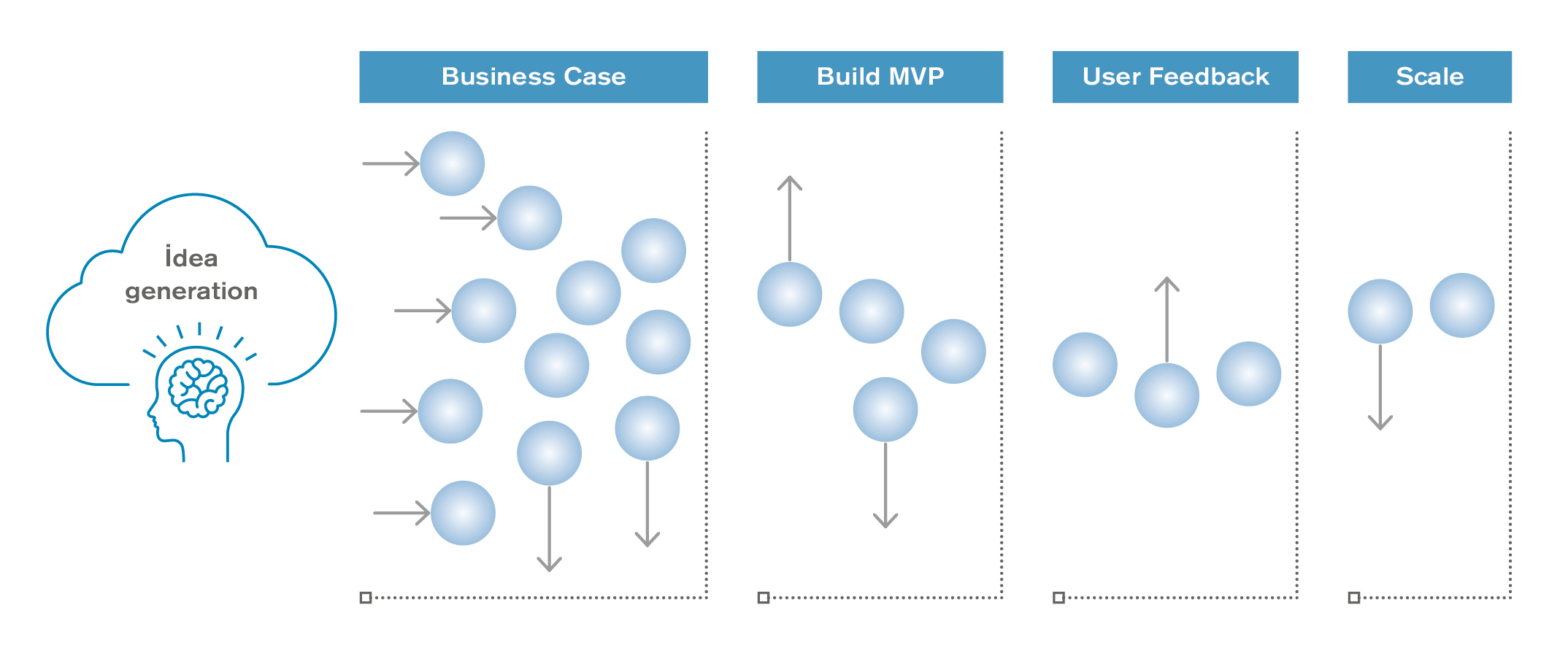
Many organisations are still engaging with the business through a demand/supply model. The expectations for IT are, however, shifting and this traditional model is causing pain. In the digital era, companies need to move beyond the old paradigm of ‘business’ versus ‘IT’.
Presentation by the lecturer: 3 x 30 minutes intertwined with 3 x 20 minutes discussion and reflection
As digital technology redefines the way work is done in virtually every line of business, every worker will need some level of technology skill. As a result, the distinction between ‘business jobs’ and ‘IT jobs’ is fading away, and new roles are emerging, which include elements of both. Due to this changing nature of jobs, the days when enterprise technology could be viewed as someone else’s concern are rapidly coming to an end. To engage in and contribute to a tech-driven business environment, all staff must become Tech fluent. Companies need to offer tech education programs, both to the employees as well as to the senior management and the supervisory/governing boards. Part of this Module will be all about organizational «Tech Savviness».
Some innovations cannibalise on existing business and can only scale if they are protected from internal (HQ) “innovation antibodies”. Such new business initiatives need an environment at the edges of the enterprise to grow. Innovation Labs are explicitly set up outside of the IT department and outside the business lines as standalone entities, entirely focused on delivering successful innovations. Joint business and IT Agile teams - referred to by Gartner as Fusion Teams - work together across the innovation lifecycle to ideate, prototype, develop, test, and scale-up (if successful) new innovations. In addition, the mechanism of Centers of Excellence (CoE) and Centers for Enablement (C4E) can be used to foster innovation inside the company. This Module will highlight some best in class examples.
Fuelled by trends like Agile, Cloud and Tech fluency in lines of business, we see a shift towards IT capabilities being organised closer to - or even embedded within - the business. This shift «disrupts» the IT department’s traditional monopoly on access to, knowledge about and funding for Information Technology. In its full version, business unit directors manage their IT/digital as an integral part of their business, like other assets under their command and control. The Module will deal with the pro’s and cons of the different models that are out there and lead into a discussion on what model suits what maturity level best.
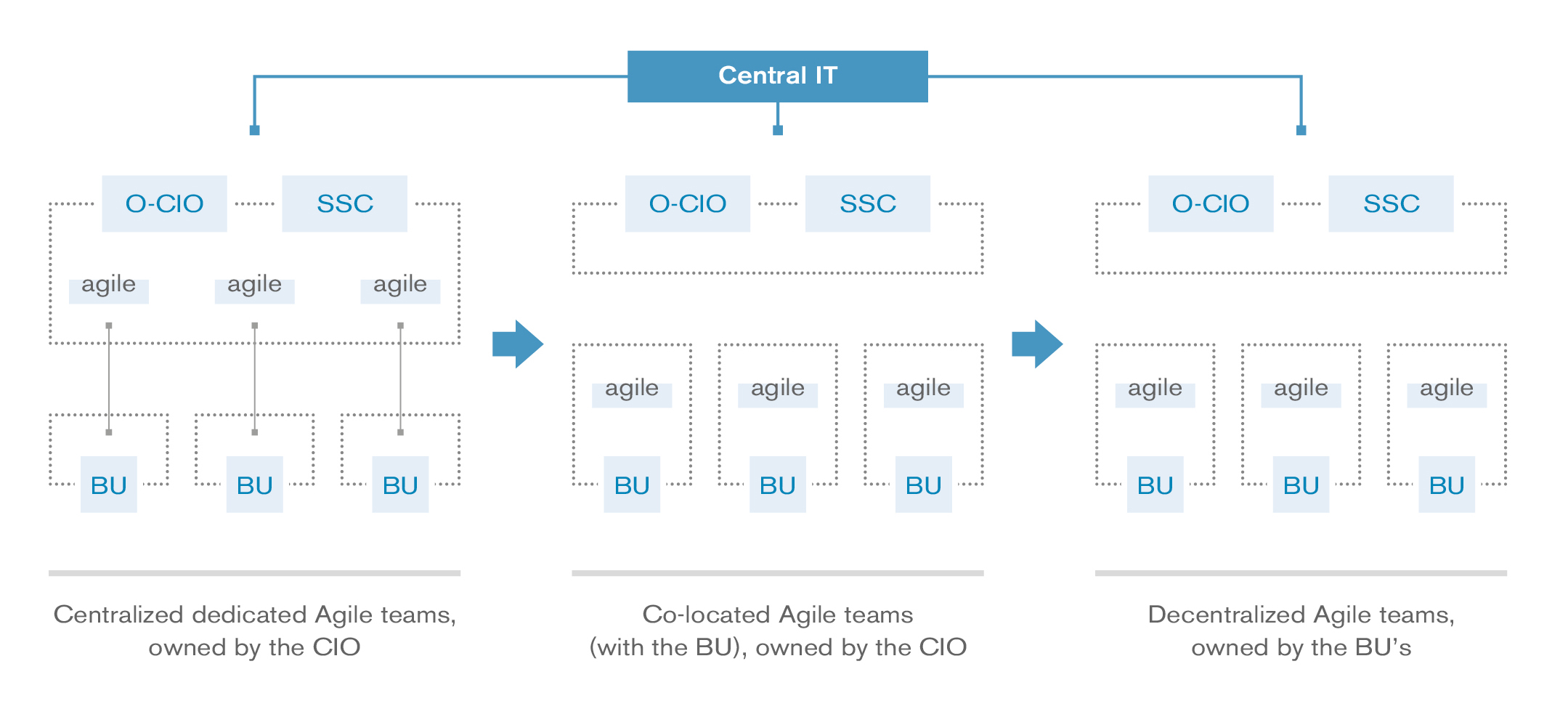
Enterprises experience huge people challenges as existing IT tasks disappear, remaining IT tasks transform, and new IT tasks emerge. At the same time, the entire workforce needs to acquire a unique digital era skillset.
Presentation by the lecturer: 60 minutes
There is no doubt that the digital revolution will not only impact the workforce in the business but will impact the IT workforce as well (and even stronger). Trends towards automation and cloud will drive large volumes of manual work out of the organisation. At the same time, enterprises reconsider the balance between contracted roles and internal roles that the organisation might consider to be strategic for this digital age. Furthermore, technologies like AI, IoT and Robotics will create the need for jobs that did not exist before, and that are strategic for the future business. The IT job market is changing rap- idly; CIOs will increasingly be hunting for brand new roles. This Module will explore the dilemma’s and issues involved creating a future proof tech workforce.
The general profile of associates in the organisation is changing. In this digital era, associates need to be equipped with additional skills such as design thinking, human-centric design, hypothesis generation and storytelling. These skills are, however, scarce in traditional organisations. Acquiring these in part “soft-skills”, tend to pose a significant challenge for existing IT workforces, even more than developing new technical skills.
The future organisation will need to move away from structures that are based on hierarchies of functional groupings. Instead, their primary units will self-organising pods and teams. Rather than maintaining a fixed structure for a longer period, the new organisation will be fluid as new pods / teams can be formed, and existing pods/teams can be dissolved as the need for it arises. Due to this changing organisational paradigm, the traditional question «For whom do you work?» is being replaced by «With whom do you work?»
This Module will explore the dilemmas and issues involved in creating and planning for the tech workforce of the future.
Zoom breakout session — interview your fellow students on their company/organisation’s status quo regarding tech-workforce skills/profiles. Identify «New roles», «Evolving roles» and «Diminishing roles»: 30 min
Presentation of findings + discussion: 30 min
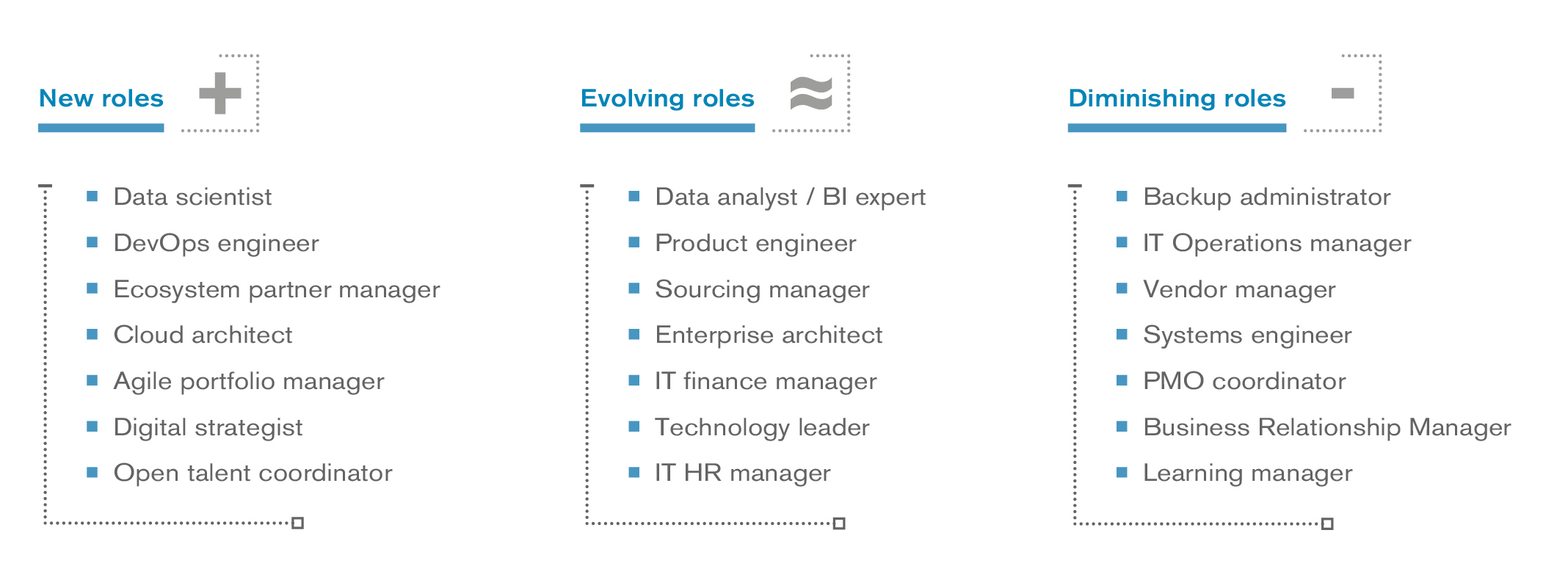
Follow the Money – as the budget mix shifts in favour of innovation; accountability for budgets becomes more distributed. Funding sources are much more allocated to domains covering design, operate and continuous improvement whilst budgets shift towards end to end customer journeys or company processes. Instead of allocating the entire tech-budget up front, flexibility is added by securing the overall spend upfront, but re- allocating certain funds on a regular basis to cater for new priorities or to properly respond to (digital) disruptions.
Presentation by the lecturer: 60 minutes
What we refer to as ‘technology’ varies from mature and highly predictable IT to new and highly explorative solutions. These two extremes need to be managed in different ways. What works for the one, kills the other. Each mode requires its own governance, sourcing, funding, and both risk appetite and risk management.
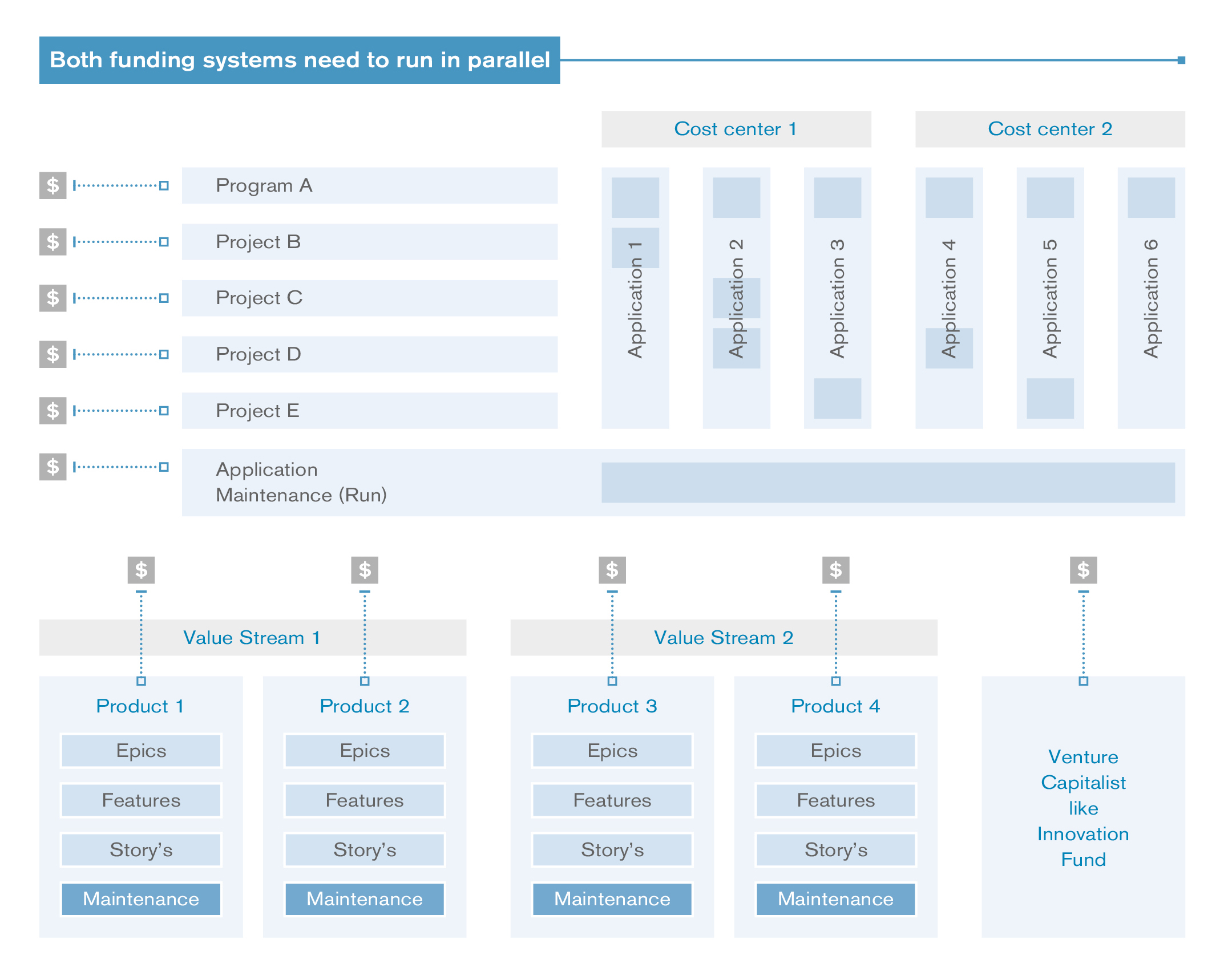
Due to digital disruption, the role of technology in the enterprise is only set to expand. To alleviate these challenges, three fundamental shifts need to be made. A larger share of the budget must be allocated to innovation, at the cost of traditional technology expenses (i.e. save to invest). The total technology spent must increase, since new digital technology cannot be funded from cost savings alone. Digital innovation must be funded from outside the traditional IT budget.
In digital companies, project portfolio management is giving way to product portfolio management, with product funding replacing project funding. In these product centric organisations, long-lived Agile teams handle both ‘run’ and ‘change’ for digital products, which are managed under a single product backlog. Once the product is funded, the product manager and Agile team jointly decide how to spend the budget, allowing maximal flexibility in allocating budget to market opportunities.
This Module will explore the dilemmas and issues involved in creating a governance and budgeting process that keeps a balance between governance and financial oversight versus financial flexibility to respond to disruption with rapid funding of innovation initiatives. That includes the acceptance that part of the tech- budget is allocated to allow the organization to “fail gracefully” in order to learn faster by failing.
Zoom breakout session — interview your fellow students on their company/organisation’s tech budgeting models. Identify funding models that allow for rapid response and controlled experimentation: 30 min
Presentation of findings + discussion: 30 min
Organisations adopt the vision, values, culture and leadership required to build digital DNA, as they move from ‘doing digital’ to ‘being digital’.
Presentation by the lecturer: 60 minutes
Digital leadership is about having a compelling digital vision to get people started and get everyone pulling in the same direction. At the same time, decision making authority tends to be distributed to the teams that do the work and have the most significant expertise. Personal traits of digital leaders are:
A digital way of working has a distinguished culture and set of values. Consider (in addition to the items described under ‘Digital era skillset’ in section 4.2 of this report):
There isn’t a single configuration of Digital DNA that is best for all enterprises. Like with human DNA, the basic building blocks can form many different combinations, some successful, others less so.
During this Module four patterns or ‘archetypes’ of digital DNA will be introduced.
The existence of different successful digital DNA configurations means that enterprises should make a deliberate choice in their journey to becoming digital.
Zoom breakout session — interview your fellow students on their company/organisation’s Digital DNA. What archetype currently prevails within your organisations and what archetype should you be striving for in the future: 30 min.
Presentation of findings + discussion: 30 min
There is no one ‘best’ answer to the question who will lead the digital transition, and how ‘digital’ organised. Multiple models can be successful, however, there are some clear do’s and don’t’.
Presentation by the lecturer: 60 minutes
Together with Cloud and Data, Digital has been one of the three macro forces that shaped technology enabled business innovation in the past decade. This first wave can best be characterised as focusing on the digital experience. Although this first wave is still playing out (and will continue to do so in the next decade), the next wave is rapidly approaching. This wave will be driven by technologies like the Internet of Things (IoT), Augmented Reality (AR), Virtual Reality (VR) and Intelligent Interfaces (voice control, virtual assistants). Together, we refer to this as digital reality. Enterprises cannot ignore the power of digital experience, and digital reality and need organise themselves to turn their digital transformation into a success.
In this Module we shall address two major questions:
Zoom breakout session - interview your fellow students on their company/organisation’s digital organisation characteristics and ways of working. How is it structured, how mature is it in terms of producing exciting digital experiences? What is lacking?: 30 min.
Presentation of findings + discussion: 30 min
Data analytics and Artificial intelligence transform enterprises to insight-driven organisations. Technology leaders need to decide what their ambition is and how to organise for data.
Presentation by the lecturer: 60 minutes
The role of data and analytics is shifting from merely analysing what has happened (the rear-view mirror) to real-time views in what is happening, and even further to the ability to predict what will happen next and to prescribe a recommended response. Artificial Intelligence (also referred to as cognitive computing) will be the primary driver of this shift in the next decade.
Due to this development, data organisations extend their scope. Some already have put in place operational efficiencies (data quality/management/re-use/analytics and BI) and risk (compliance, data security/ privacy/continuity). And they still need to cater to the traditional focus areas: operational efficiency and risk management. However, increasingly they augment their scope with value creation (data discovery, exploration, prediction, pattern recognition).
In this Module we shall address five major questions:
Zoom breakout session — interview your fellow students on their company/organisation’s data capabilities along with the five questions above: 30 min.
Presentation of findings + discussion: 30 min
Cloud and automation enable a digital transformation whereby the focus of the central organisation shifts to the role of cloud broker and advisor, enabling ‘Thin IT’ with DevOps teams in the Lines of Business. Meanwhile, a move towards cloud-enabled Platforms is taking place, allowing for organisations to compose Packaged Business Capabilities with minimal effort using «low code» and «no-code» capabilities.
Presentation by the lecturer: 60 minutes
Traditional centralised IT departments supported the business with IT services like selecting, deploying, and scaling applications and infrastructure. However, for most businesses, there is no unique business value in (manually) maintaining servers and data-centres. Adoption of cloud computing combined with automating tasks that were previously done manually (e.g. provisioning, patching and backup), instils a promise that traditional management of these resources by central IT will, in time, cease to exist. DevOps teams, using ‘infrastructure as a code’ to provision the resources they need, can become end-to-end responsible for business-driven IT services, enabling them to realise the promise of more agility, faster development, lower IT costs and higher quality of service.
Meanwhile, increasingly cloud-enabled low code Platform capabilities are rapidly becoming available. They allow for both technical and business users to deploy fast digital business experimentation: enterprise process automation, the use and integration of standard B2C apps, the creation of App Ecosystems, the ability to unlock legacy systems and expose them as services through API.
In this Module we shall address four major questions:
Zoom breakout session — interview your fellow students on their company/organisation’s cloud strategy along with the four questions above: 30 min.
Presentation of findings + discussion: 30 min
To be able to monotize both short-term and long-term digital opportunities; organisations require their Technology Operating Model approach to take into account each of these nine shifts. Since these are not isolated phenomena, a holistic approach will unveil company-specific interdependencies that need to be acknowledged. Missing or more big shifts will likely result in a Technology Operating Model that is ill-equipped for the digital era. The framework provides for a language allowing business and Tech Teams collectively to fully appreciate the implications involved.
Presentation by the lecturer: 10 minutes
In this final Module of the course, an introduction will be delivered on the relevance of the platform from five different perspectives:
In this Module we shall work with the framework taking two or three genuine client cases from the participating organisations. Here’s a typical example:
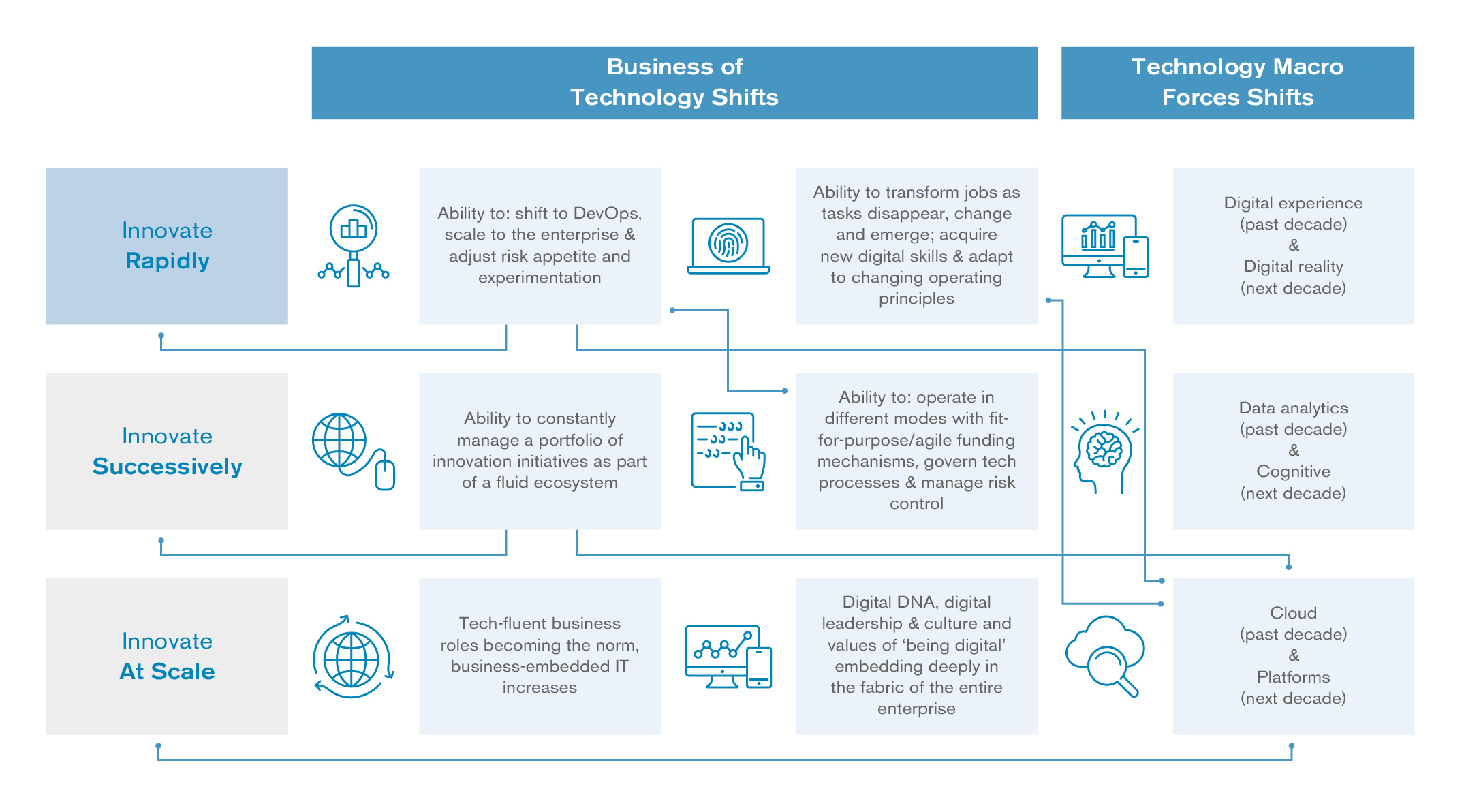
If an organisation concludes that it needs to deliver digital innovation faster (rapidly - 1), then a move towards companywide agile ways of working (2) would help. Backed by a strategic decision for a cloud-first and Platform strategy (3), instant access to cloud-native digital technologies such as AI and Blockchain become available (4). These new technologies, leveraged in fluid innovation ecosystems (5), help to innovate successively (6) and at scale (7) when supported by tech fluent business roles and business- embedded IT (8) with the proper digital organisation (9).
Mastering this 9 Shifts framework will not only help organisations to identify value delivered tailored to their specific strategies and markets. It will also force both the Business and Tech Executive Teams to acknowledge some of their hard calls (showstoppers) jointly. Thus, strategic technology decisions and investments will become a joint responsibility of business and IT executives alike.
Zoom breakout session 50 min — apply the framework to 2 or 3 concrete cases as represented by the participants
Presentation of findings + discussion: 60 min
Entrepreneurs-in-Residence accepted for the WIPA Start-up Exchange Programmes are awarded a professional certificate featuring their proficiency level on global entrepreneurship and a personal WIPA Identity Card.